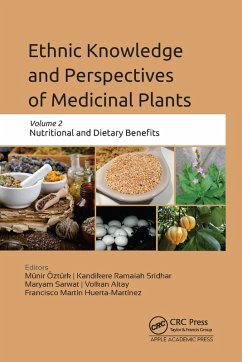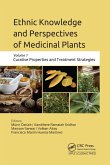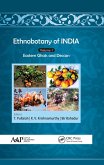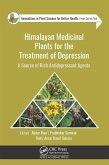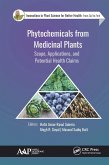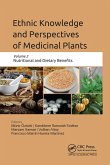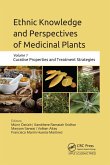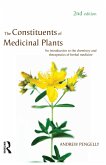This new 2-volume set aims to share and preserve ethnic and traditional knowledge of herbal medicine and treatments, while also emphasizing the link between biodiversity, human nutrition, and food security. Ethnic Knowledge and Perspectives of Medicinal Plants is divided into two volumes, with volume 1 focusing on the traditional use of curative properties and treatment strategies of medicinal plants, and volume 2 addressing the varied nutritional and dietary benefits of medicinal plants and the practice of Ayurveda. Both volumes stress the importance of bioresources for human nutrition and nutraceuticals based on ethnic knowledge and the need for efforts to protect biodiversity in many regions rich with medicinal plants.
Exploring the benefits of medicinal plants in disease prevention, treatment, and management, Volume 1 discusses the traditional use of medicinal plants as promising therapeutics for cancer, liver conditions, COVID-19, and other human ailments. It examines the efficacy of Ayurvedic and Chinese herbal medicine, Indian traditional medicine, and other ethnic herbal practices used by indigenous peoples of Azerbaijan, South America, Turkey, India, etc. A variety of plants are discussed, and the ethnomedicinal applications of over 100 wild mushrooms for their medicinal and healthcare purposes are elaborated on.
While volume 1 focuses primarily on natural plant resources for addressing specific health issues, volume 2 looks at traditional medicinal plant use for their nutritional and dietary benefits, while also encouraging the preservation of biodiversity for healthy and sustainable diets. The volume presents information on over 2200 vascular plant taxa from 127 families as well as many taxa from leaf parts, fruits, underground parts, floral parts, seeds, and more that have potential use as edible food plants. Ethnic knowledge on the wild edible mushrooms is an emerging area, which is unique and is dependent on the folk knowledge of tribals; this volume discusses the unique nutritional attributes of wild edible mushrooms (206 species belonging to 73 genera) in Southern India. The authors look at various lichens as nutritional aids and medicine and as flavoring agents and spices. Fucoidans derived from the seaweeds (and spirulina) are described for their antioxidant activity, nutritional and anti-aging properties, antiviral activities, anti-cancer properties, anti-diabetic properties, and more. The authors also examine how ethnicity affects healthcare/nutritive systems at different levels through various dynamics such as lower income, inability for services uptake, disputes among different ethnic groups, cultural attitudes (some ethnic group are vegetarian), lack of socio-economic resources, and disease prevalence.
Together, these two important volumes aim to preserve and disseminate the valuable ethnic knowledge of medicinal plants gained over thousands of years and to promote the value of integrating and safeguarding biodiversity.
Exploring the benefits of medicinal plants in disease prevention, treatment, and management, Volume 1 discusses the traditional use of medicinal plants as promising therapeutics for cancer, liver conditions, COVID-19, and other human ailments. It examines the efficacy of Ayurvedic and Chinese herbal medicine, Indian traditional medicine, and other ethnic herbal practices used by indigenous peoples of Azerbaijan, South America, Turkey, India, etc. A variety of plants are discussed, and the ethnomedicinal applications of over 100 wild mushrooms for their medicinal and healthcare purposes are elaborated on.
While volume 1 focuses primarily on natural plant resources for addressing specific health issues, volume 2 looks at traditional medicinal plant use for their nutritional and dietary benefits, while also encouraging the preservation of biodiversity for healthy and sustainable diets. The volume presents information on over 2200 vascular plant taxa from 127 families as well as many taxa from leaf parts, fruits, underground parts, floral parts, seeds, and more that have potential use as edible food plants. Ethnic knowledge on the wild edible mushrooms is an emerging area, which is unique and is dependent on the folk knowledge of tribals; this volume discusses the unique nutritional attributes of wild edible mushrooms (206 species belonging to 73 genera) in Southern India. The authors look at various lichens as nutritional aids and medicine and as flavoring agents and spices. Fucoidans derived from the seaweeds (and spirulina) are described for their antioxidant activity, nutritional and anti-aging properties, antiviral activities, anti-cancer properties, anti-diabetic properties, and more. The authors also examine how ethnicity affects healthcare/nutritive systems at different levels through various dynamics such as lower income, inability for services uptake, disputes among different ethnic groups, cultural attitudes (some ethnic group are vegetarian), lack of socio-economic resources, and disease prevalence.
Together, these two important volumes aim to preserve and disseminate the valuable ethnic knowledge of medicinal plants gained over thousands of years and to promote the value of integrating and safeguarding biodiversity.
Dieser Download kann aus rechtlichen Gründen nur mit Rechnungsadresse in A, B, BG, CY, CZ, D, DK, EW, E, FIN, F, GR, HR, H, IRL, I, LT, L, LR, M, NL, PL, P, R, S, SLO, SK ausgeliefert werden.

